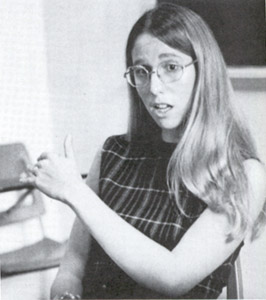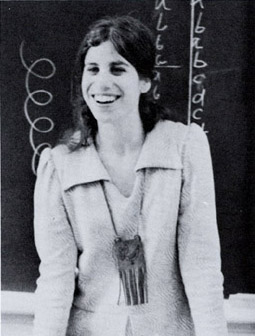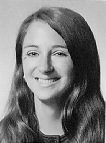
Recollection
Elizabeth Smith-Mao, '71, reflects on her experience as a college-educated woman. "I never sensed any prejudice or any discrimination until the time I decided to go to graduate school. And, maybe we were just totally unaware, but I never perceived it and I did very well at Bucknell. And I was thinking about going to graduate school in anthropology and a professor said to me, 'But Liz, you know that you'll be discriminated against when you apply to graduate school . . .' It hit me like a ton of bricks. It was the very first time." The professor thought that one of the male candidates would be accepted before a woman despite her better qualifications.
Liz says, "We didn't have harassment, we didn't know what it was, you know, we just experienced it. I had that happen but I never felt discrimination. The women, in general, were very bright."
Among the wave of women applying to law school in the early seventies, Liz was one of the first women to be admitted. She also has the distinctions of being the second professional woman hired by the Texaco Company, and the first woman vice-president of Texaco.
WRC Interview, June 1996
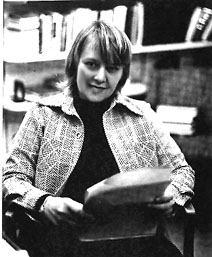
Recollection
Sally Nyquist, Associate Professor of Biology and Head of the Biology Department, was hired in 1972. She recalls those earlier times at Bucknell:
"I interviewed about a week or two after the big flood everyone still talks about. I came actually under rather strange circumstances. I interviewed here for a job for which I was not selected. But Wendell Smith was the provost at the time, and he was very interested in affirmative action and increasing the number of women on the staff. And so, the Biology Department got an additional position or slot, so to speak, if I would be hired. So that's how I arrived, in compliments, I guess, of Wendell Smith. At the time, well for most of my time here at Bucknell, we were in Taylor Hall that existed prior to the recent remodeling. So I had an office down in what we affectionately called "The Dungeon" in the basement there in Taylor Hall. They eventually put in an outlet at the end of the hall for safety reasons and so on, but it was always pretty dark. The word dungeon was somewhat apropos. But, I had my office space and research down in the basement there. And then, somewhat later, my office was moved to a better location in the basement of the Botany Building. It was a major improvement.
When I first came, we didn't have many women faculty. Hulda Magalhaes was there, and I think at the time I came she might have been the only woman faculty member in the natural sciences, although I think Sally Morrison, Professor of Mathematics, came about the same time I did. So there have always been at least two of us, but not a whole lot."
At the completion of the interview, Dr. Nyquist shared a story that she wished she'd put on tape. Her first year here at Bucknell (1972-73), she was invited to the Engineering Department picnic, as the natural science professors often were. When she got to the picnic, a big truck pulled up and delivered a large cake out of which a woman popped. Dr. Nyquist recalled that it was an awkward situation being that she and the cake woman were the only two women there. That was the last time she attended the picnic.
WRC Interview 6/96
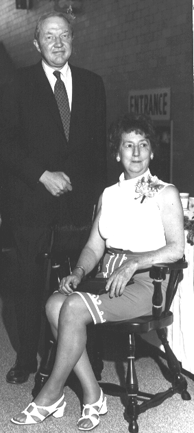
The Alumni Chair for Distinguished Service is awarded to Trennie Eisley, '31, Master's '34, "for eminent and meritorious service and demonstrated loyalty to Bucknell University" at the annual Alumni luncheon on May 27. The citation accompanying the award honors her as "an alumna who yields to no alumnus in the intensity of her devotion to Bucknell University . . . recognized for candor in her private and public comments, she has long been an advocate of honesty as the best policy in accentuating the positive about the University." She is pictured here with University President Charles Watts.
Public Relations News Release 5/27/72
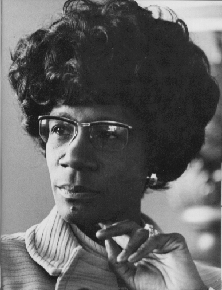
Shirley Chisholm runs for President, the first African-American and first woman to campaign for the nomination of a major political party. She won 152 delegate votes at the 1972 Democratic National Conventional which Senator George McGovern was nominated. She was the first Black woman elected to Congress and the first Black to serve on the House Rules Committee. She retired from Congress in 1982.
The Feminization of Power
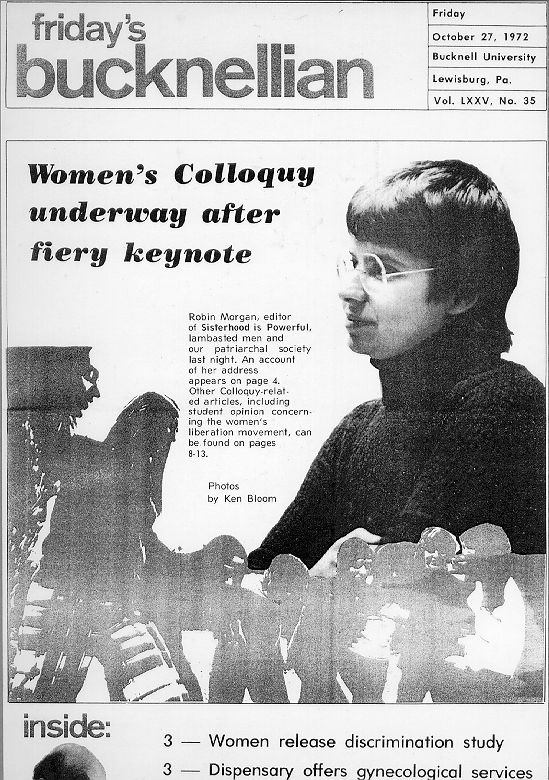
"Women and Contemporary Society" is the theme of the annual fall Colloquy
held October 26-29. Among the 60 invited guests are Robin Morgan, editor
of Sisterhood is Powerful, presenting "Radical Feminism," and the Chicago
Women's Liberation Rock Band. Workshops include: growing up in America,
the feminist movement, women and the law, sexist rock culture, women from
minority groups, abortion, alternatives to marriage, sex roles and sex
images, anatomy of a sex discrimination case, and the importance of lesbianism
to feminism.
The Bucknellian includes coverage of many Colloquy discussions and prints the Affirmative Action Report on women at Bucknell. The Women's Colloquy sparks much dialogue and some controversy on campus.
The Bucknellian, 9-11/72
A Special Bucknellian Report on Women's Lib is published in the March 15 issue. Articles address the black aspect of women's liberation, the ratio of men to women students which is 5 to 3, stereotypes that stifle women, discrimination in hiring practices, and profiles of professional women graduates.
The Bucknellian, 3/15/72
The school paper carries a three-page report on "An Affirmative Action Plan for Women at Bucknell University" prepared by members of the Women's Equity Action League: Dee Ann Finkel, Zoya Jenks, Amy Kaminsky, Patricia Longley, Maura Marchand, Maureen Murphy, Bonnie Nelson, and Patricia Rom.
The report begins, "Affirmative action is the taking of positive steps to end sex discrimination. It is important to emphasize that the desire not to discriminate does not constitute positive action. The obligation of the university is to integrate women into all parts of the academic community..."
The piece also cites supporting data, saying "one can conclude that" 1) Recent efforts to improve the balance have made little progress toward an acceptable goal. 2) There is clear discrimination in salaries for women. 3) In 1972-73 women have presented more academic preparation than their male counterparts for the same position and ranks. Bucknell discriminates against women students in its admission policies. This year women comprised only 37 percent of the freshman class. Yet, according to class standings, the women were more qualified than the men. Forty-eight percent of the men and 78 percent of the women ranked in the top tenth of their graduating class."
The report concludes with 12 proposals ranging from the actie recruitment of women; equal opportunity for admissions, scholarships, professional advancements, and job placement services; a pregnancy and parental leave policy; a codification of job descriptions with standard starting wages and increases for clerical staff; the establishment of a women's studies program; the hiring of a gynecologist at the infirmary; and the founding of a child care facility.
The Bucknellian 10/27/72

Recollection
Carol Noel Hawley,'73, Associate Director of Financial Aid at Bucknell University recalls her time as a student. "When women got pinned or engaged on campus, it was very common for their sororities to have something called a candlelight. What would happen is the women would call into the sorority's phone number, which was in the president's room right there in the suite and say 'I want to schedule a candlelight for tonight or tomorrow night.' There would be signs posted that there would be a Beta Gamma candlelight or a Kappa candlelight. The candlelight itself is when they would go into a room, and the candlelight would be passed around. The first time nothing would happen, but the second time, if you were the person pinned, you would blow it out. If it went around twice it meant someone was engaged. Then the third time around you were engaged. It was kind of funny because my husband and I got together very early on my freshman year. We were lavaliered which used to be the pre-pinning. It was the little fraternity letters on a necklace. I have a story about losing my lavaliere when I was kidnapped by a bunch of people, losing it at midnight behind Trax, and then the guys coming out to help me find it the next morning. Then we found this lavaliere in the slush the next morning.
My husband and I were lavaliered in October. We were very serious. Spring time used to be the time for candlelighting, everyone got pinned or got engaged. The seniors got engaged and the underclassmen got pinned. The guys that did the pinning used to get thrown in the river over by May's Landing. So they never pinned in the winter time because they didn't want to get thrown in the river in winter. So we had gone through a number of candlelights. Every time there was a candlelight people would say, 'Carol is it yours?' I wanted to be pinned but it wasn't mine and I was just getting frustrated, 'No it is not mine, you will know when it is mine.' So what my husband did unbeknownst to me was he called and scheduled a candlelight a couple of days before the actual candlelight and didn't tell me we were getting pinned. So these people were still asking me and I was getting furious, "No!" I was obviously believable because I didn't think it was my candlelight. Finally, on our six month lavaliering anniversary, April 29, he gave me the pin. I believe he scheduled a candlelight for that night. He told me when he gave me the pin, you have a candlelight for tonight. It was very believable. Nobody thought it was my candlelight because I was so sincere that it was not my candlelight, but it was. So it was a bit of a surprise on my husband's part. It was kind of a romantic thing. He sometimes is that romantic, but I thought that was really romantic."
WRC Interview, 10/95
|
Amy Kaminsky |
|
Susanne Juhasz
|
Over 500 students sign a petition in April urging the University to retain a course entitled "Women in Literature," taught by instructors Amy Kaminsky and Suzanne Juhasz. Provost Wendell Smith cites lack of funds to pay part-time faculty as the reason for not offering the course in the fall. The course, which is currently offered as a University Course, rather than an English course, was over-enrolled this spring; ten students were dropped and told they could take it when it was offered again.
The Bucknellian, 4/10/73
Students attend a lecture by feminist Betty Friedan at Susquehanna University in April. The author of The Feminine Mystique calls for women and men to participate in a "massive unfinished revolution which will restructure society." Calling women "the last proletariat," Friedan remarks that "society was rigged against us."
The Bucknellian, 4/13/73
Dr. Maureen Murphy receives her Ph.D. from Catholic University and is appointed as assistant Dean of the College of Arts and Sciences on a part-time basis. Her new duties include academic advising for freshmen, coordinating institutional resources for advising women students, and coordinating the University's Affirmative Action Program.
Maureen recalls that at the time there was some resistance to affirmative action, and she was the first person to have responsibilities for reviewing hiring practices. She told the president that a single individual could not deal with overseeing job searches and so a group was formed which became the Equal Opportunity Employment Committee. "One of the biggest changes was that people realized that the searches had to be open searches," Maureen remembers. "It wasn't enough just to pick up the telephone and get a name of a male Ph.D. student from an old friend and then hire him . . .I think what the committee did was say that, 'hey, your pool isn't large enough. We need to see the people who are in your pool, what their resumes look like, what their credentials look like,' . . .We began to push them a little bit to open up the doors. I think that the number of women and minority faculty members began to increase."
Public Relations News Release, 6/12/1973; WRC Interview 2/95
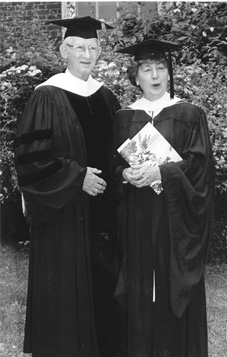
Trennie Eisley, Director of Public Relations, is awarded the John E. Wilkinson Award for Administrative Excellence at commencement. President Charles Watts notes that Miss Eisley "for many years has sought with great success to capture the changing facets and very human people of this university for many audiences." He continues "many of us owe a debt not only of thanks for her skills and her understanding of our ambitions, but also praise for her charity in rendering our blemishes less telling than they would otherwise appear." Established by friends and associates of John E. Wilkinson, the award is given each year in recognition of outstanding achievement and service in the administration of higher education.
She is pictured here with another honoree, Arthur Brandon, who received his master's degree in 1927.
Public Relations News Release 5/31/74
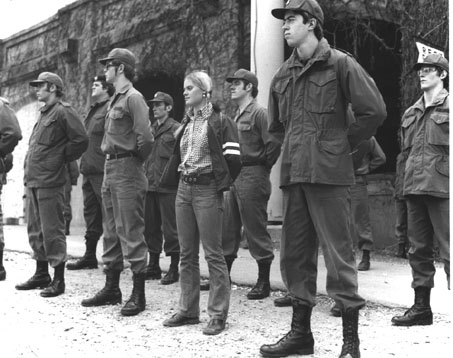
Two Bucknell sophomores - Terry and Sherry Grant - are the first couple in the nation to enlist in the Army's Reserve Officer Training Corps. Five-foot-two-inch blonde Sherry, 18, and her 19-year-old six-foot husband will receive their degrees, commissions and assignments in 1977. An Education major, Sherry hopes to integrate her training with her military assignment.
Bucknell's top cadet last year, Cpl. Terry Grant outranks his wife, who is a recruit. He attends the University on an ROTC Scholarship which he applied for as a high school senior. The Army pays all of his college costs except room and board. "ROTC is a good way to get an education when money isn't in oversupply," says Terry. At present there are 19 men attending Bucknell on full tuition scholarship awarded by the military.
Bucknell University Archives
In January, two women's groups, Indigo and Women for Change merge to form Amicae, a group interested in achieving equal rights for women. Derived from the feminie flural of the Latin word, "friend," Amicae is "committed to the creation of free academic and social inequities on campus.
Members include independents, sorority members, and non-student members of the Bucknell community. In its founding year, the group hosts the big/little sister reception for the first year women, holds various get togethers, publishes newsletters which are distributed to all Bucknell women and produces a Women's Guide to Bucknell which was distributed to all freshwomen. The women have formed task forces to study areas in depth. They examine Bucknell's curriculum and encourage the development of women's studies classes. A women's dorm, Martin House, serves as a women's center, housing a library where Amicae's task force findings can be found. Meetings and classes are held there, although one need not be a member of Amicae to live in the house.
The Bucknellian, 10/11/74
The L'Agenda issues a second volume focusing primarily on women at Bucknell.
Aside from featuring faculty women in the academic departments, the book
also champions Women's Studies and Black Studies. Ken Bloom, who joins
Penny Smith and Marian Wolbers as co-editor, writes in the introduction:
"This book is our expression, as complete in scope as our consciousness.
The Book is meant to raise the consciousness of others -- to show that
there is an alternative to conventional directions. . . .
Our purpose is to reaffirm personal freedom by our exposure of positive images. We do this in hopes of helping to actuate the concept of a community committed to the free exchange of ideas and the free interaction of personalities. In this kind of environment our images and illusions will be constructive and not stereotypic."
The book includes sections on women as individuals, friends, mothers, daughters, partners, and professionals. It also offers commentary on issues of choice, the Greek system, race concerns, and creativity.
L'Agenda 1974, Volume 2
Judy Becker became Assistant to the Provost in 1974 on a part-time basis. Over time, Judy's role increased in responsibility where her position became more of an Assistant Provost. At the time there were very few women in administration and faculty. During Judy's tenure, she noticed an increase in these numbers.
In the 1970's, a group of women faculty and a few administrators formed WEAL, Women's Equity Action League, a group dedicated to affirmative action. Wendell Smith spearheaded the committee that drafted an affirmative action plan that expanded in the late 1970's. In 1980, Judy Becker was named affirmative action officer, and Wendell Smith stepped out of that position. During the same time, Judy served as coordinator of the Equal Employment Opportunity Committee. Both Judy and Wendell drafted an affirmative action hiring plan for Bucknell that came out in 1980 and was used until 1991.
Together with the Vice President for Academic Affairs, Judy developed a strategy for increasing faculty diversity which became known as the Shinn-Becker plan. The first part involved the hiring of one black faculty member for each of five years. The second was the hiring of a replacement for a retiree three or four years before the time of the retirement. This was an advantage to the departments because they were able to utilize that extra person to expand the curriculum. Also, Bucknell didn't have to hire from a pool that was available at the time. The third part of the plan was the hiring of permanent replacement faculty for departments that were seven or more. Departments were able to hire someone to cover for leaves from other members of the department.
WRC Interview, 9/6/96
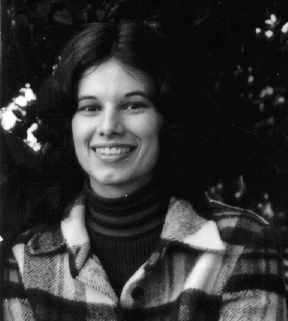
Recollection
Eugenia Gerdes, who came to Bucknell as an assistant professor in Psychology and later became Dean of the College of Arts and Sciences, recalls when a now-retired member of the faculty came to her and asked her to be secretary of the Phi Beta Kappa chapter. "I guess I was uppity enough to ask him if he was asking me just because I was a woman. He was a full professor, and he said 'no, I was the secretary last year.' So, I learned not to assume the worst and to take things on fact value."
Genie also thinks it is important to realize that a college experience in this type of campus centers around what happens outside the classroom as much as it does inside the classroom. "We know from our own surveys that men and women feel that there is a level playing ground in the classroom, however, they are more hesitant about support for women's efforts and achievements among their peers [outside the classroom], and for eighteen to twenty-one year-olds how they're thought of by their peers is tremendously important."
WRC Interview, 1/30/95
Recollection
Jean Schackelford came to Bucknell in 1974 for an interview and accepted the postition as a professor in the Economics department. As one of the few women professors on campus at the time, she was involved with many progressive ideas that put an emphasis on women at Bucknell.
"I think it was around 1980, late 70s, early 80s. Karen Gartner and I had gotten a grant from Women's Educational Equity Fund. We put on a program called Women in the Workplace; we brought in a series of speakers and did a series of events . . . part of what was going to happen was the development of a course called Women in the Workplace. So that was a course that I'd been teaching for a couple of years." Jean was also involved with a group of like-minded faculty, teaching in the women's studies area within departments. The group asked "Well, do we do enough? What should we be doing about this? Is there a way that we can meet and talk about some of these kinds of things?"
She later joined with a group of faculty who were interested in creating an environment where both women's issues and racial issues would be supported, which led to the beginning of the Race/Gender Resource Center and later the Women's Resource Center.
"The Race and Gender Resource Center was really to help people who were teaching courses in race and gender, but really didn't have the time to necessarily go out and work up programs and necessarily find the most recent scholarship in those areas . . . I guess that was turning point as well . . . When suddenly you could actually do women's studies, or you could do issues in race. We were also moving ahead with the Women's Resource Center because we realized there needed to be something parallel, a support unit for students."
WRC Interview
While Sherry Grant and her husband Terry are making history as ROTC's first couple-enlistees, two other Bucknell women became "firsts" when they enrolled in ROTC this fall. Both freshmen, they are Susan Delaney, of Hornell, NY and Kathleen B. Mitchell, of Derry, NH. Sherry Grant is shown in the center and Susan Delaney [right] are pictured above.
Bucknell University Archives
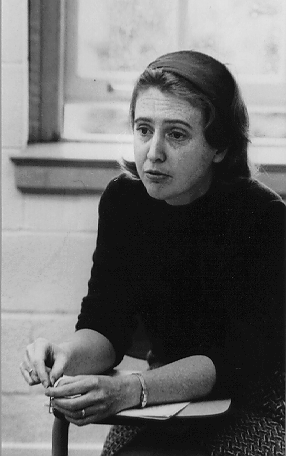
Recollection
Associate Dean of Arts and Sciences, Maureen Murphy remembers an exciting period of women's activism on campus. She recalls that in the 1970's there were consciousness-raising groups that involved the Bucknell and Lewisburg community and that women at the university got together to draft their own affirmative action plan. "People thought that everything was possible, that people could change things, that things could be different. We didn't have a Race/Gender Resource Center. We had a few courses in Women's Studies, and that was just the beginning. But the students the students themselves were the force behind changes. And, I think they in turn sought out the faculty women that were here to help. And they really were movers" In citing the 1974 special edition of the yearbook with its emphasis on women, Maureen says, " I think they really did get this place thinking, and moving along and probably if it wasn't for some of the women students of the time, we never would have had a Women's Studies minor. At that time students were saying 'what about?' or 'why can't we do this?"' Maureen's first Women's Studies course came about because of a woman student who came in and asked her to sponsor her for an independent study on women and religion.
WRC Interview, 2/15/95
Recollection
In an interview, Professor of English Emeritus Jack Wheatcroft explains that Alice Rousseau, an employee of the University, was the prototype for Edie Dougan in his 1975 novel Edie Tells: A Portrait of the Artist as a Middle-Aged Cleaning Woman.
She was a custodian in Vaughan Literature Building, and we got to be friendly. She would use my office to sit and read when she was to be doing other things that didn't seem to her to be so important. And, it never bothered me that I'd come back from class and find her sitting there reading, having pulled a book down from the shelf. And, the next thing I knew, (I was writing a little bit of poetry in those days) she'd write a little note: "This is dreadful! You can do better than that!"
The next thing I knew, she began to make suggestions. And, the next thing I knew, she was writing some poems of her own. She was not an educated womean, but she had qualities that a poet needs. She had imagination. She had passion. She was perceptive, observane, and she actually had a good ear. And so she wrote some lovely little poems.I can remember one in particular for the son she never had. She had two daughters, but no sons. It was a very moving poem indeed. In the novel I don't giver her any children at all--just a way of changing things of course; I didn't want to get children involved in what I was doing in the novel.
Well, it got out that we had a custodian who was also a poet and the students asked Alice to give poetry readings. And before you know it, she was giving poetry readings in coffee shops. She also began to act. She had a part in one of my plays that was done by Cap and Dagger, the Theater Department at Bucknell. And she had quite a coterie of students who formed around her. She invited them to her house. I didn't know anything about her private life; that's all made up in the novel. But the custodian who is a poet, a portrait of the artist as a cleaning woman, a middle-aged cleaning woman, which is the subtitle of the novel--that's factual.
WRC Interview, 4/96
